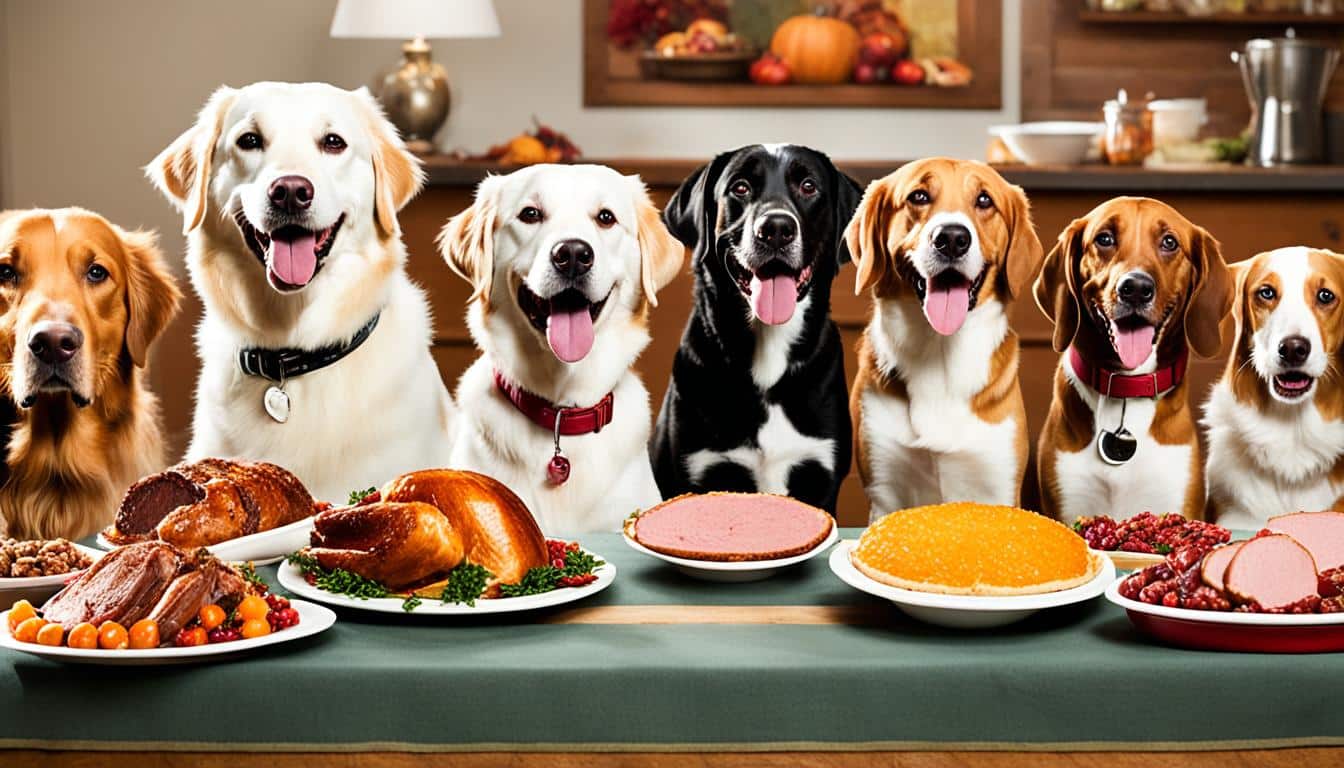Can Dogs Eat Turkey? When Is It Safe, And When Should They Avoid It?
Can Dogs Eat Turkey a delicious and nutritious addition to our Thanksgiving feasts, but what about our furry friends? Can dogs eat turkey? The answer is both yes and no. While plain, cooked turkey meat can be a safe and healthy part of a dog’s diet, there are certain precautions that pet owners need to keep in mind to ensure their dog’s safety and well-being.
First and foremost, it’s important to understand that not all parts of the turkey are safe for dogs. Some seasonings and ingredients commonly used in cooking turkey can be toxic to dogs, causing digestive issues, upset stomach, or even more serious conditions like pancreatitis. It’s crucial to avoid giving dogs turkey that is seasoned with salt, fats, spices, garlic, onions, or anything that may be harmful to their sensitive digestive systems.
Additionally, it’s essential to remove the skin and bones from the turkey before feeding it to your dog. The skin is high in fat and can lead to digestive upset, while cooked bones can splinter and pose a choking hazard or cause damage to the digestive tract. Even small turkey bones can cause serious injuries to dogs. It’s always best to err on the side of caution and avoid feeding your dog any type of cooked bones.
When it comes to commercial dog foods, it’s important to read the labels carefully. While some may contain turkey as an ingredient, others may have additives or preservatives that can be harmful to dogs. It’s always advisable to choose high-quality dog foods recommended by veterinarians and avoid feeding your dog any processed meats or products that may contain harmful ingredients.
If you’re considering adding turkey to your dog’s diet, it’s essential to consult with your veterinarian. They can provide personalized advice based on your dog’s specific needs and health conditions. Your vet can also guide you on appropriate portion sizes and frequency of feeding turkey to your dog.
In conclusion, plain, cooked turkey meat can be a safe and nutritious addition to a dog’s diet when given in moderation and without seasonings or added ingredients. However, it’s crucial to ensure that it is bone-free, the skin is removed, and it is offered as a part of a well-balanced diet. By following these guidelines and consulting with your veterinarian, you can safely incorporate turkey into your dog’s meals and let them enjoy a little taste of the holiday season.
Key Takeaways:
- Plain, cooked turkey can be a safe and healthy addition to a dog’s diet.
- Avoid giving dogs turkey with seasoning, as it can be toxic and cause digestive issues.
- Remove the skin and bones from turkey before feeding it to your dog to prevent choking hazards and digestive problems.
- Choose high-quality dog foods and avoid processed turkey products that may contain harmful additives.
- Consult with your veterinarian before adding turkey to your dog’s diet, especially if they have any preexisting health conditions.
Is Turkey Good for Dogs?
Turkey can be a beneficial addition to a dog’s diet. It is a good source of protein and contains essential vitamins and minerals that can support a dog’s overall health and well-being.
- Protein: Turkey meat is rich in protein, which is essential for dogs as it helps in the growth, repair, and maintenance of their muscles and tissues.
- Vitamins: Turkey meat contains vitamins B6 and B12, which play a crucial role in maintaining a dog’s nervous system, energy levels, and overall immunity.
- Minerals: Turkey meat also provides important minerals like selenium, zinc, and phosphorus, which are necessary for strong bones, healthy skin, and a functioning immune system.
However, it’s important to provide turkey in moderation and as part of a balanced diet. Excessive consumption of turkey can lead to health issues, such as obesity. It’s always best to consult with a veterinarian to determine the appropriate amount of turkey to include in your dog’s diet.
Can Dogs Eat Turkey Bones?
Dogs should never be given cooked turkey bones, or any type of cooked bones for that matter. Cooked poultry bones can splinter easily and pose a significant risk to dogs. They can cause injuries to the mouth, throat, and digestive tract, leading to choking, blockages, and possible internal damage. It’s crucial to ensure that any portion of turkey given to a dog is bone-free to avoid potential harm.
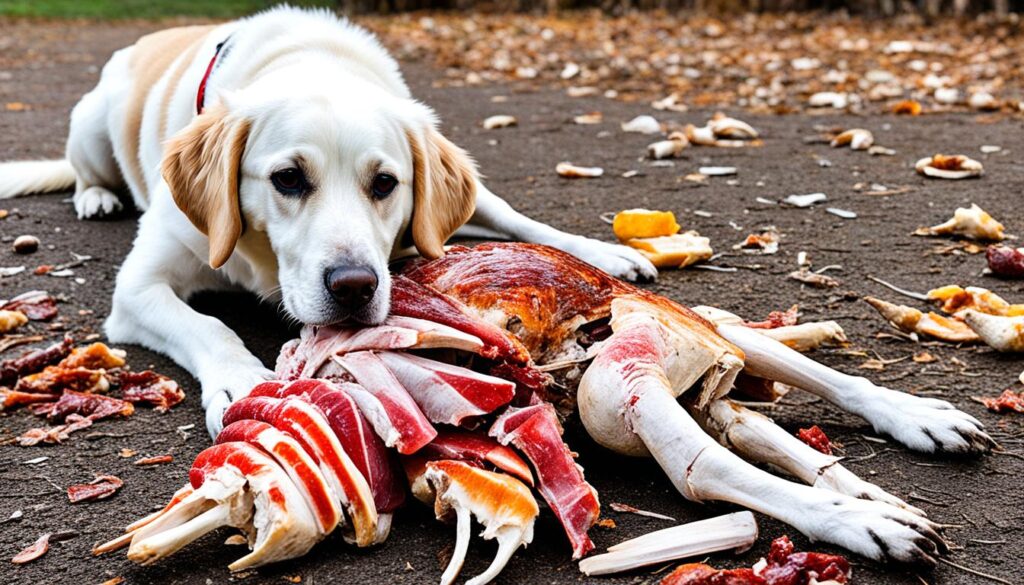
Dangers of Turkey Bones
Cooked turkey bones pose several dangers to dogs:
- Choking Hazard: The size and shape of turkey bones make them prone to getting stuck in a dog’s throat, leading to choking. This can be a life-threatening situation that requires immediate veterinary attention.
- Intestinal Blockage: If a dog swallows a piece of turkey bone, it can become lodged in their digestive tract, causing a blockage. This can interfere with the normal passage of food and waste through the intestines and may require surgical intervention to remove.
These risks apply not only to turkey bones but also to bones from other cooked poultry, such as chicken or duck. It’s essential to be vigilant and ensure that dogs do not have access to any type of cooked bones.
“Cooked turkey bones can splinter easily and cause injuries to dogs’ mouths, throats, and digestive tracts.”
How to Safely Feed Your Dog Turkey
When it comes to feeding your dog turkey, it’s crucial to prioritize their health and safety. Following these essential guidelines will ensure that your furry friend can enjoy turkey as a tasty and nutritious treat without any adverse effects.
Remove Turkey Skin
Before serving turkey to your dog, it’s important to remove the skin. Turkey skin is rich in fat, which can lead to digestive issues and even pancreatitis in dogs. By removing the skin, you can provide a healthier and more digestible meal for your canine companion.
Feed Small Portions
When it comes to feeding turkey to your dog, moderation is key. Start by offering small portions of plain, cooked turkey meat. This approach helps prevent any potential digestive upset and ensures that your dog’s overall diet remains balanced.
Avoid Cooked Bones and Seasonings
It’s imperative to remove all cooked bones from the turkey before giving it to your dog. Cooked bones can splinter and pose a serious choking or intestinal blockage hazard. Additionally, seasoning the turkey with spices, salt, or other additives can lead to digestive issues or even toxicity in dogs. Stick to plain, unseasoned turkey to keep your pup safe and healthy.
Remember, always remove the turkey skin and bones, and avoid adding any seasonings to your dog’s portion.
Consult a Vet
Prior to introducing turkey into your dog’s diet, it’s essential to consult with a veterinarian. Your vet can provide personalized guidance based on your dog’s specific health conditions or dietary needs. They can further advise on portion sizes and ensure that incorporating turkey into your dog’s diet will not pose any risks.
Take Precautions When Feeding Your Dog Turkey
Feeding turkey to your dog can be a delightful experience for both of you. By removing the skin, offering small portions, avoiding cooked bones and seasonings, and seeking guidance from a veterinarian, you can safely incorporate turkey into your dog’s diet.
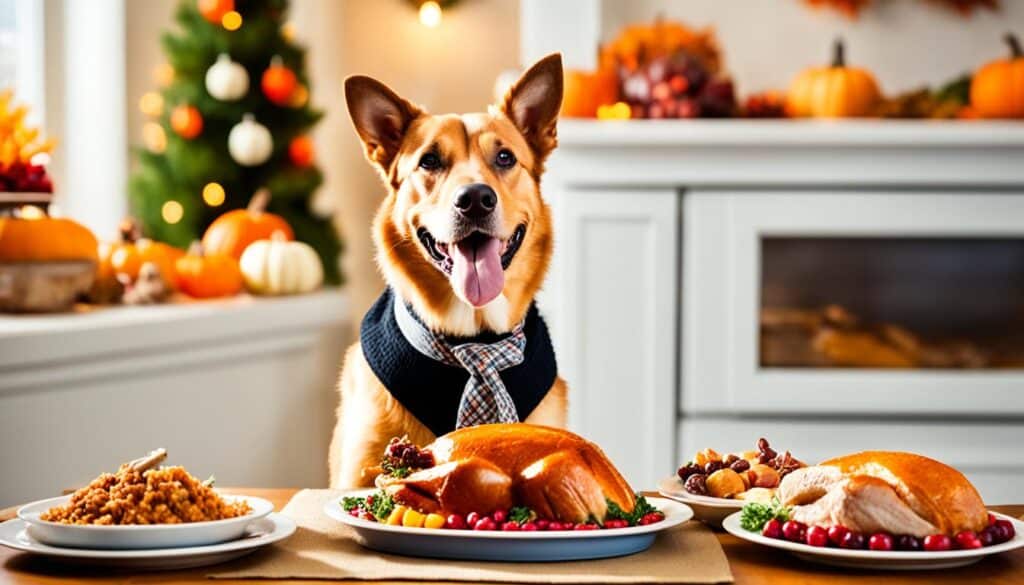
| Safe practices to feed your dog turkey: |
|---|
| Remove the turkey skin |
| Feed small portions |
| Avoid cooked bones and seasonings |
| Consult with a vet |
Can Dogs Eat Turkey Lunch Meat or Smoked Turkey?
Dogs should not be given turkey lunch meat or smoked turkey. These types of processed meats often contain high amounts of sodium, preservatives, and other additives that can be harmful to dogs. Additionally, ingredients like garlic and onion, commonly found in processed meats, can be toxic to dogs. It’s best to avoid giving these types of turkey products to dogs.
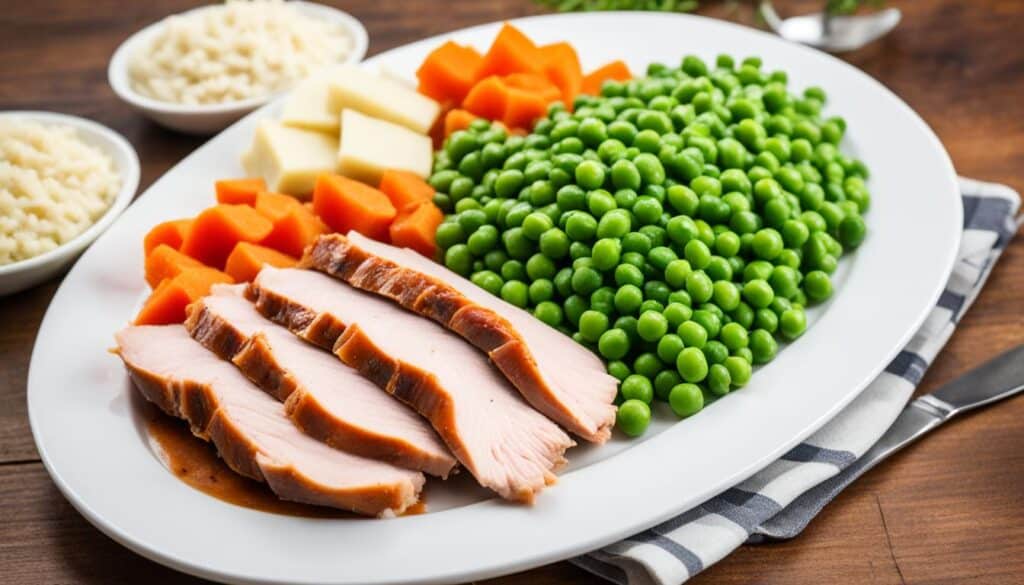
| Turkey Lunch Meat | Smoked Turkey |
|---|---|
| High in sodium | High in sodium |
| Contains preservatives | Contains preservatives |
| May contain toxic ingredients like garlic and onion | May contain toxic ingredients like garlic and onion |
How Much Turkey Can Dogs Eat?
The amount of turkey that a dog can safely consume will depend on various factors, including their size, age, and overall health. It’s important to find the right balance when incorporating turkey into a dog’s diet.
As a general guideline, turkey should only make up a small portion of a dog’s overall diet. Treats, including turkey, should make up no more than 10% of a dog’s daily food intake. The remaining 90% of their diet should come from a well-balanced dog food that meets their nutritional needs.
Consulting with a veterinarian is crucial in determining the appropriate portion sizes for your specific dog. They can provide tailored feeding guidelines based on your dog’s individual dietary requirements and health conditions.
Remember, maintaining a balanced diet is essential for your dog’s overall well-being. While turkey can be a healthy addition to their diet, it should be given in moderation and as part of a well-rounded meal plan.
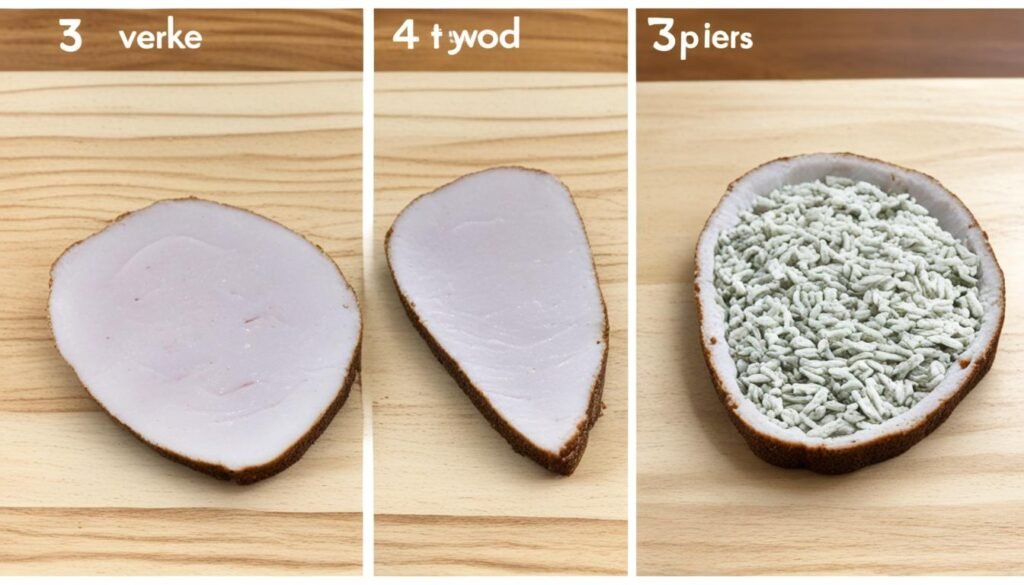
Feeding Guidelines for Dogs:
- Make sure turkey comprises a small portion of your dog’s diet.
- Treats, including turkey, should make up no more than 10% of their daily food intake.
- The remaining 90% should come from a balanced dog food diet.
- Consult with a veterinarian to determine appropriate portion sizes for your dog.
- Consider your dog’s size, age, and overall health when determining portion sizes.
By following these feeding guidelines and consulting with a veterinarian, you can ensure that your dog enjoys turkey as a safe and healthy addition to their diet.
Can Dogs Be Allergic to Turkey?
While food allergies in dogs are relatively rare, it is possible for dogs to develop an allergic reaction to turkey if they are repeatedly exposed to it. Just like humans, dogs can develop an immune response to certain proteins found in turkey, leading to an allergic reaction.
Common symptoms of a food allergy in dogs can include:
- Itching
- Gastrointestinal upset
- Vomiting
- Diarrhea
- Skin issues such as redness or rashes
If you suspect that your dog may have a turkey allergy, it is important to consult with a veterinarian for proper diagnosis and guidance. A veterinarian can help determine if your dog’s symptoms are indeed caused by a turkey allergy or if there might be another underlying cause. They can also recommend appropriate treatment options and provide advice on managing your dog’s diet to avoid future allergic reactions.
Allergy Testing for Dogs
If your dog’s symptoms are persistent or severe, your veterinarian may recommend allergy testing to identify the specific allergens causing the reaction. This can help you pinpoint the exact source of the allergy and avoid it in the future. Allergy testing can be done through blood tests or skin tests, depending on the veterinarian’s preference and your dog’s specific needs.
Discussing your dog’s symptoms and medical history with a veterinarian is crucial in diagnosing and managing food allergies. They have the expertise to guide you through the process and provide the best care for your furry companion.
| Symptoms | Possible Causes |
|---|---|
| Itching | Allergic reaction to turkey proteins |
| Gastrointestinal upset | Allergic reaction to turkey proteins |
| Vomiting | Allergic reaction to turkey proteins |
| Diarrhea | Allergic reaction to turkey proteins |
| Skin issues | Allergic reaction to turkey proteins |
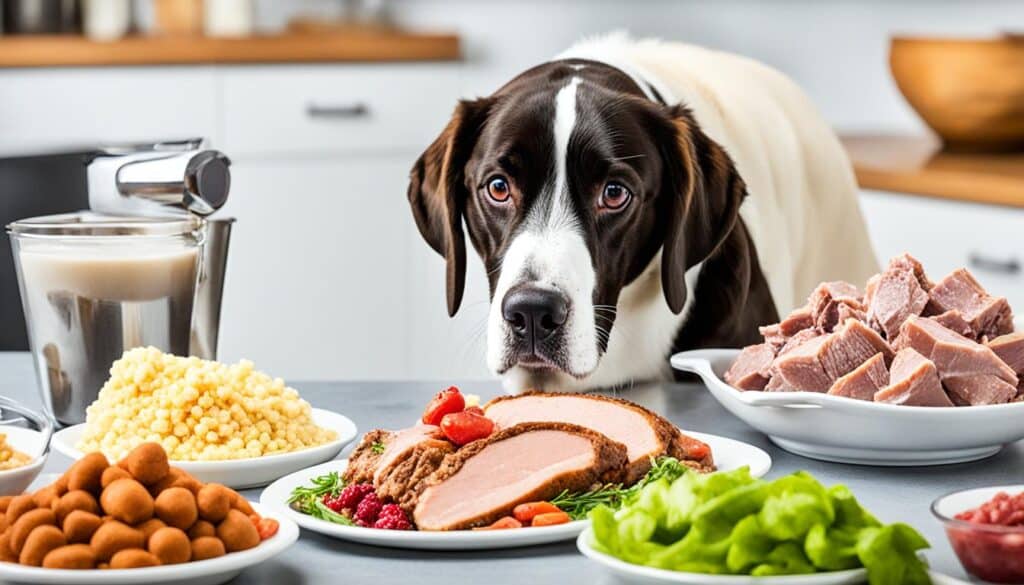
Image caption: Understanding your dog’s symptoms and seeking veterinary advice is essential for managing food allergies and providing appropriate care.
Can Dogs Eat Turkey Jerky?
Dogs should not be given turkey jerky. Like other types of jerky, turkey jerky is often high in sodium and may contain preservatives that can be harmful to dogs. Additionally, jerky poses a choking hazard, especially for small breeds or dogs prone to gulping their food. It’s best to avoid feeding dogs turkey jerky.
Feeding turkey jerky to dogs can introduce several health risks. Firstly, turkey jerky, similar to other types of jerky, is often prepared with high amounts of sodium as a part of the flavoring and preservation process. High sodium intake can lead to dehydration, kidney problems, and an increased risk of developing heart disease in dogs. Moreover, turkey jerky can contain preservatives such as nitrates and nitrites, which have been linked to adverse health effects in dogs, including gastrointestinal upset and allergic reactions.
Furthermore, turkey jerky poses a significant choking hazard for dogs, especially those who are small in size or have a tendency to quickly consume their food. The tough and chewy texture of jerky makes it more prone to getting lodged in a dog’s throat or causing an obstruction in the digestive tract, which can be life-threatening and require immediate veterinary intervention.
Also Read:- Explore Common Dog Walking Injuries And Prevention Strategies
In summary, it is not recommended to feed dogs turkey jerky due to its high sodium content, preservatives, and the risk of choking. Instead, opt for safer alternatives such as plain, cooked turkey meat without seasoning, and consult with your veterinarian for appropriate and nutritionally balanced treats for your canine companion.
Conclusion
In conclusion, it is safe for dogs to eat turkey when it is cooked plain, without any seasonings or added ingredients. However, it is important to follow specific feeding guidelines to ensure the safety and wellbeing of your furry friend.
When feeding your dog turkey, make sure to remove the skin, bones, and excess fat, as these can pose potential risks. Feeding small portions of turkey as an occasional treat can be a healthy addition to your dog’s diet, providing them with essential nutrients.
It is crucial to consult with a veterinarian before introducing any new food to your dog’s diet, especially if they have any underlying health conditions. Your vet can provide personalized feeding guidelines and advice based on your dog’s specific needs.
By following these guidelines and seeking professional advice, you can ensure that your dog enjoys turkey safely as part of their balanced diet. Remember, the health and wellbeing of your dog should always be a top priority.
FAQs
Q: Can dogs eat turkey?
A: Yes, dogs can eat turkey in moderation, but it’s important to ensure that the turkey is fully cooked and without any seasoning or bones.
Q: Is turkey bad for dogs?
A: Turkey can be bad for dogs if it is not cooked properly or if they consume bones, skin, or fatty parts which can cause digestive issues or even be a choking hazard.
Q: When is turkey safe for dogs?
A: Turkey is safe for dogs when it is cooked plain, without any seasonings, and served in small amounts as an occasional treat.
Q: When should dogs avoid turkey?
A: Dogs should avoid turkey that is seasoned, contains bones, skin, or fat, as these can be harmful to their health and digestive system.
Q: Can dogs have raw turkey?
A: It is not recommended to feed dogs raw turkey due to the risk of harmful bacteria like Salmonella which can make them sick.
Q: Is ground turkey safe for dogs?
A: Ground turkey can be safe for dogs if it is thoroughly cooked and served plain without any additives or seasonings.
Q: Is turkey neck safe for dogs to eat?
A: Turkey neck can be safe for dogs to eat if it is fully cooked and served without any bones to prevent choking hazards.
Q: Can dogs eat turkey bacon?
A: It’s best to avoid feeding dogs turkey bacon as it is often high in fat and preservatives which can be harmful to their health.
Q: How to share turkey with your dog?
A: If you want to share turkey with your dog, make sure it is plain, cooked, boneless, skinless, and given in small amounts as an occasional treat.
